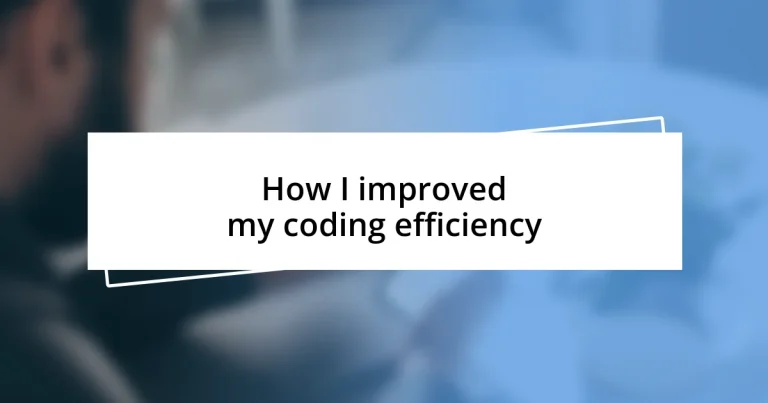Key takeaways:
- Understanding and planning project requirements significantly enhances coding efficiency and reduces time wasted on misaligned features.
- Identifying common coding inefficiencies, such as lack of clear objectives and overcomplicating solutions, leads to improved productivity and satisfaction.
- Regularly reviewing coding progress and sharing knowledge with others fosters continuous improvement and reinforces learning through collaboration.
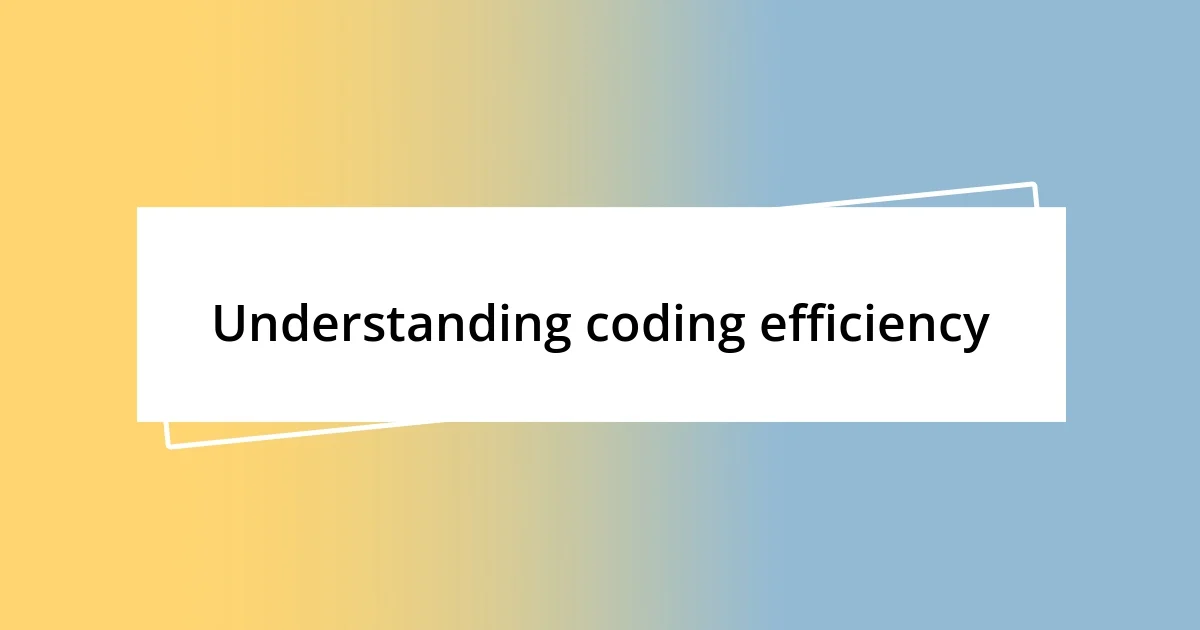
Understanding coding efficiency
Coding efficiency refers to how effectively a programmer can produce correct, maintainable, and clear code in a timely manner. I often found myself grappling with time-consuming tasks and complex bugs, leading me to wonder: what if there was a way to streamline my workflow? It’s not just about writing code; it’s about writing code that works efficiently and can be easily understood and modified later.
I vividly recall a project where I spent hours implementing a feature that ultimately didn’t align with user needs. That experience taught me the importance of planning and understanding requirements before diving in. Have you ever found yourself stuck in a coding quagmire because of a lack of foresight? In those moments, I learned that taking a step back to map out my approach drastically improved the overall efficiency of my coding process.
Using tools, such as version control systems and code linters, has also become essential to my workflow. Initially, I resisted them, but once I embraced their capabilities, I noticed a significant boost in both my coding speed and accuracy. It’s fascinating how these small adjustments not only save time but also enhance my confidence in my work. After all, isn’t it rewarding when you can focus more on solving problems rather than fixing mistakes?
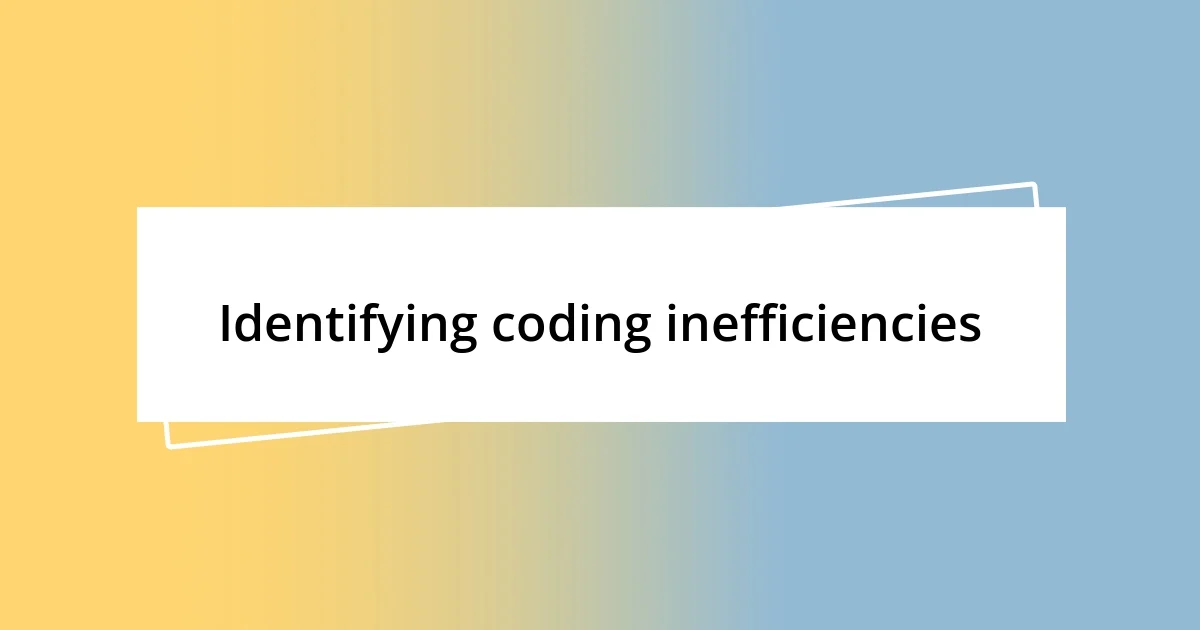
Identifying coding inefficiencies
Identifying coding inefficiencies is crucial for improving my overall productivity. I remember a time when I was knee-deep in code, trying to debug an endless loop that seemed to mock my every effort. It hit me then that a significant portion of my time was being wasted simply because I hadn’t taken the time to break down the problem. I started analyzing my coding sessions, seeking recurring obstacles that slowed me down.
Here are some common inefficiencies I’ve identified in my coding process:
– Lack of clear objectives: Sometimes I dive into coding without a complete understanding of the project goals.
– Inconsistent coding practices: Not adhering to a coding standard led to confusion and wasted hours trying to decipher my own code.
– Ignoring code reviews: Initially, I viewed code reviews as a hassle, but they are a goldmine for identifying potential pitfalls.
– Underutilizing debugging tools: I discovered that many built-in IDE tools could save me loads of time if I just took the minute to learn them.
– Overcomplicating solutions: I often favored complex solutions over simpler, more straightforward ones, which ultimately made my code harder to maintain.
Each of these insights came from moments of reflection, often sparked by frustration. By recognizing and addressing these inefficiencies, I’ve made significant strides in not just my coding speed but also my overall satisfaction with my work.
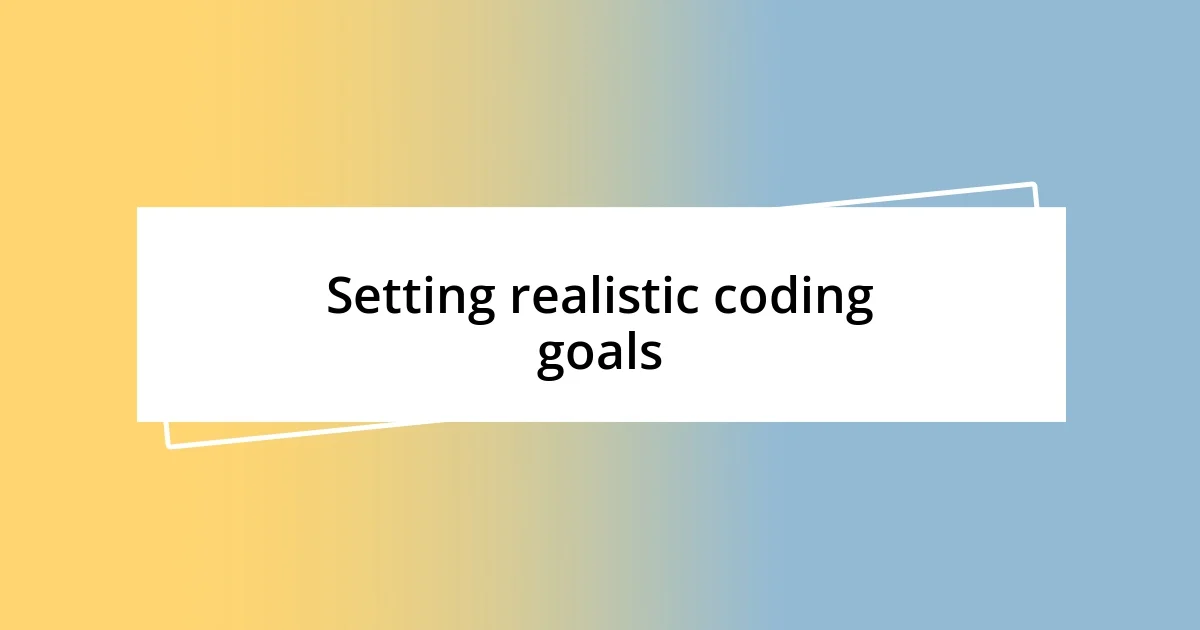
Setting realistic coding goals
Setting realistic coding goals can completely transform the way you approach your projects. When I first started programming, I often set myself ambitious targets that were impossible to meet, and it left me feeling overwhelmed. Over time, I learned that breaking tasks into smaller, achievable goals not only kept me motivated but also provided a clear path forward. Can you relate to the feeling of staring at a massive coding task and wondering where to begin? By setting smaller milestones, I found myself celebrating little victories, which significantly boosted my morale.
As I began to focus on realistic coding goals, I noticed a significant reduction in my coding-related stress. For instance, choosing to work on just one feature at a time instead of trying to complete an entire application in a week made a world of difference. I still remember spending an entire Saturday debugging because I had underestimated the complexity of a new library I was trying to implement. By setting realistic expectations, I ultimately reduced the pressure on myself, allowing for a more productive and enjoyable coding experience.
To illustrate the difference between setting unrealistic goals versus realistic goals, it helps to visualize it. The following table summarizes this contrast:
| Unrealistic Goals | Realistic Goals |
|---|---|
| Complete a full project in one weekend | Finish one feature by the end of the week |
| Write hundreds of lines of code daily | Focus on writing and testing 50 lines a day |
| Master multiple languages at once | Learn one language deeply before moving on |
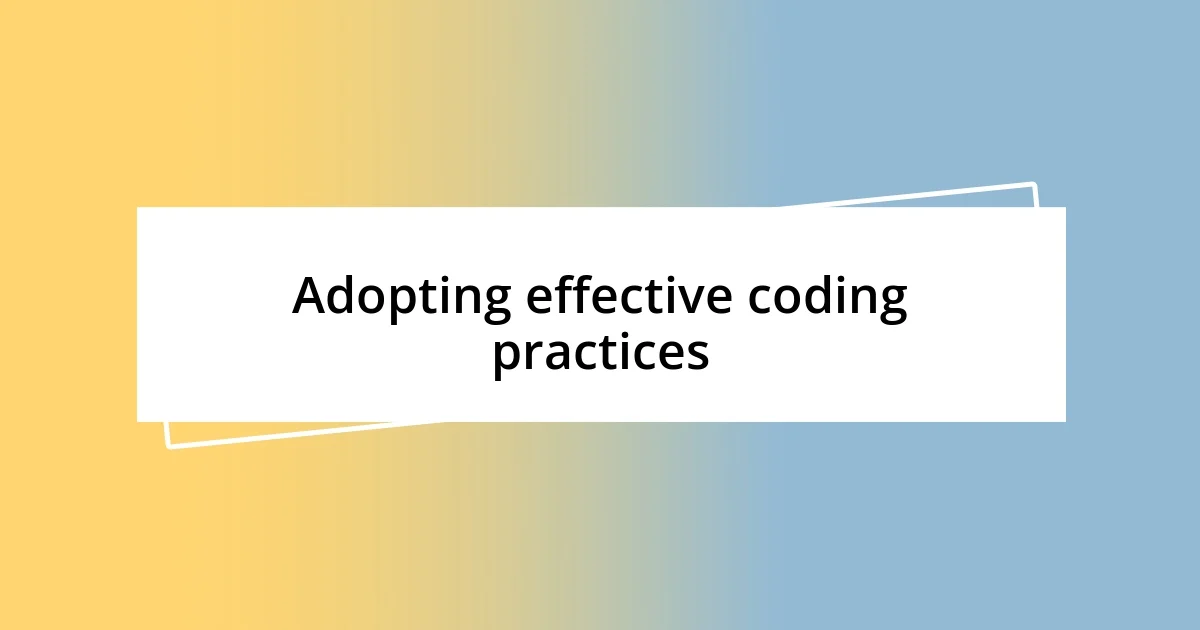
Adopting effective coding practices
Adopting effective coding practices has been a game changer for me. For instance, I used to dive headfirst into coding sessions without much thought, which often resulted in tangled logic and unwieldy code. Now, I start each session with a brief planning phase, jotting down what I hope to accomplish. This tiny shift not only saves me time but also helps ensure that my code is more organized and coherent. Have you ever sat down to code only to realize you’re not sure what you’re trying to achieve? I certainly have, and it’s frustrating!
A key practice that really transformed my approach is utilizing version control systems like Git. I remember feeling lost when I made significant changes to my code only to realize I couldn’t revert back easily. Once I embraced version control, everything changed. I felt a newfound confidence as I experimented with different solutions, knowing I could always backtrack. This practice empowers me to take risks and explore while maintaining a safety net. Isn’t it liberating to know you can always undo an error at the click of a button?
Moreover, I’ve become a huge advocate for writing comments and documentation as I code. Initially, I thought comments were just extra work, but I’ve found they save me from future confusion. I recall a project from a few months back where I revisited my older code and couldn’t remember my own logic. It was a lightbulb moment when I realized that my future self would appreciate any clarity I provide today. It’s a practice I encourage everyone to adopt—nothing feels as satisfying as effortlessly picking up where you left off!
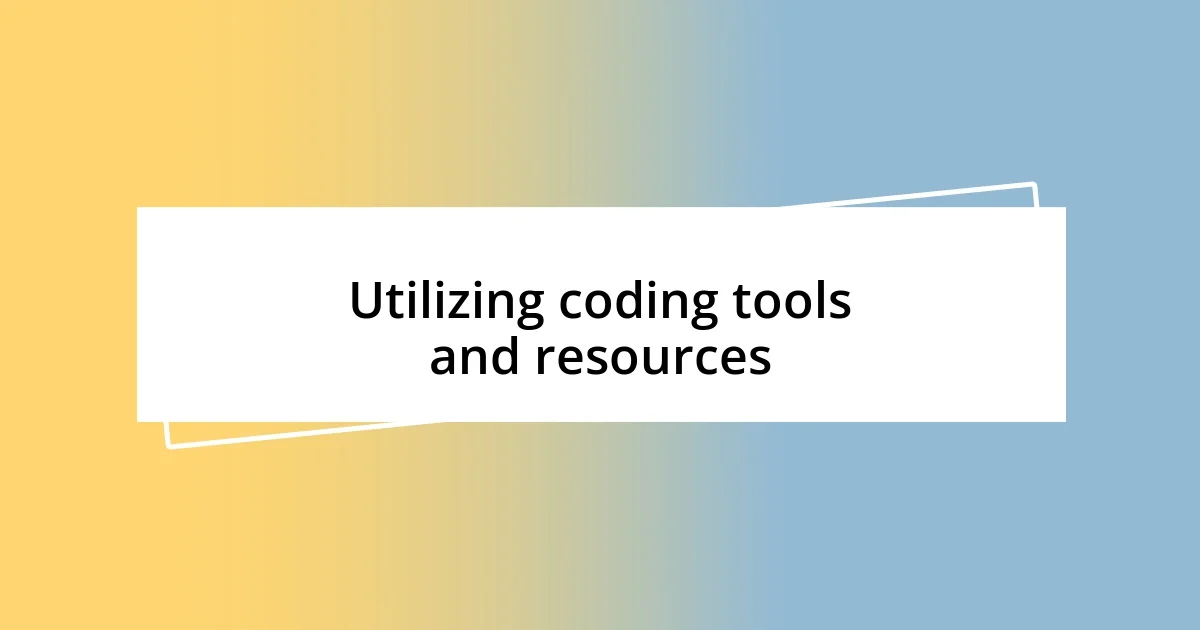
Utilizing coding tools and resources
Utilizing coding tools and resources can drastically enhance efficiency. I’ve grown particularly fond of code editors like Visual Studio Code, which offers a plethora of extensions tailored to specific programming languages. An extension I can’t live without is Prettier—it automatically formats my code, allowing me to focus more on logic rather than syntax. Have you ever wasted too much time fixing formatting issues? With this tool, I’ve found that my code is not only cleaner but also easier to read, making collaboration with others a breeze.
Another invaluable resource is online coding platforms like Stack Overflow. I remember feeling stuck on a project involving an unfamiliar API and turned to Stack Overflow. Within minutes, I discovered solutions others had already figured out. It’s amazing how a simple search can lead you to a treasure trove of knowledge just waiting to be tapped into. The community aspect is an added bonus—I’ve asked questions and even contributed my own answers, which deepened my understanding of concepts I once struggled with. Isn’t it comforting to know you’re part of a community where everyone has been in your shoes?
Lastly, I can’t stress enough the importance of utilizing version control platforms like GitHub for collaboration. When I first joined a team project, the sheer volume of changes felt daunting. However, having a central repository where we could track modifications and resolve conflicts changed everything. I felt empowered as I watched the project evolve, confident that all contributions were well-documented. There’s something incredibly reassuring about collaborating with others where everyone’s work is integrated seamlessly. How has version control impacted your projects? For me, it’s made teamwork not just achievable but genuinely enjoyable!
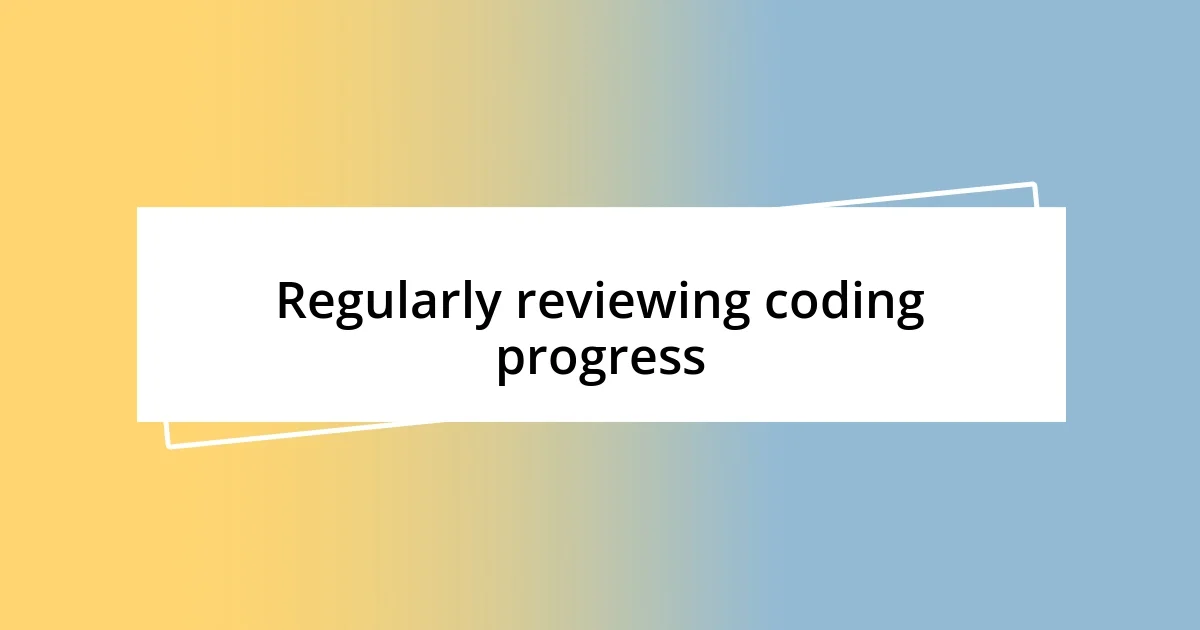
Regularly reviewing coding progress
Reflecting on my coding journey, I realized that regularly reviewing my coding progress is key to continuous improvement. Early on, I often got caught in my coding bubble, neglecting to step back and evaluate my work. It wasn’t until I set aside time weekly to review my code that I understood how much clearer my logic became. Have you ever looked back at your code and wondered what you were thinking? That moment of reflection not only clarified my thought process but also allowed me to identify patterns in my mistakes, leading to significant growth.
One particularly eye-opening experience for me was during a project where I encountered a bug that lingered for days. After several frustrating hours of debugging, I decided to implement a review session to analyze my approach. To my surprise, I discovered that I had overlooked a simple condition in my logic. That experience was a game changer! It highlighted how crucial it is to step away from the screen and assess progress. What if I had continued down the wrong path? Taking the time to review my work prevented me from compounding errors and kept my progress on track.
Now, I incorporate reviews as a non-negotiable part of my routine. I like to set aside 15 minutes at the end of each day to revisit my code and jot down questions or ideas that pop into my head. This small practice not only keeps me in tune with my projects but also fuels my creativity for future solutions. Isn’t it funny how a little reflection can open up a wealth of ideas? Embracing this habit has transformed my coding journey, giving me a stronger sense of direction and purpose in my work.

Sharing knowledge with others
When I started mentoring junior developers, I quickly realized the value of sharing knowledge. It’s surprising how much you learn when explaining concepts to others. I remember a time I was walking a newcomer through a debugging process. As I articulated my thought process, I could literally feel new connections forming in my mind about how to tackle similar problems in my own work. Have you ever felt that rush when a lightbulb goes off in both you and the person you’re teaching?
Participating in coding bootcamps and workshops has further reinforced the importance of collaborative learning. I vividly recall a session where we paired up to solve algorithm challenges. Working side-by-side with someone trying to break through their own coding barriers made me reflect on my own approach. Sharing strategies and tips not only motivated us both, but it also fostered a deeper understanding of those algorithms for me. How often do you get the chance to learn from someone with a completely different perspective? It’s invigorating!
Additionally, I believe that creating a safe environment for knowledge exchange plays a crucial role in coding efficiency. I once joined a study group where everyone felt comfortable asking questions, no matter how basic. This open atmosphere empowered us to be more curious and innovative. How liberating is it to know that everyone is there to support each other’s growth? It’s enlightening to see how sharing knowledge can transform individual journeys into a collective evolution, making coding not just a task, but a shared adventure full of possibilities.











